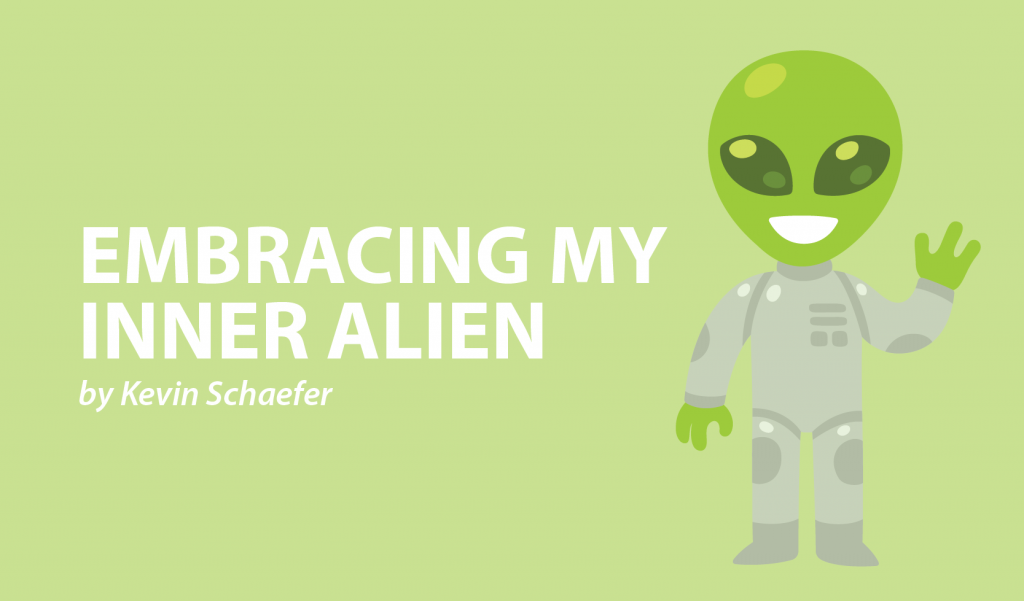How Science Fiction and Comedy Have Become Therapeutic
Written by |


As much of a geek as I am, I can’t recall the first movie I saw in theaters or the first comic book I ever read. Yet, I do remember a time in fifth grade when I heard a song that blew me away and gave me a new perspective of science fiction.
Sitting in the school cafeteria, my friend and fellow “Star Wars” acolyte James showed me a music video that brilliantly parodies “The Phantom Menace,” set to the tune of Don McLean’s “American Pie.” The song conveys the entire narrative of the movie in a manner that’s both hilarious and touching, with lyrics such as, “Oh, my, my, this here Anakin guy, may be Vader someday later, now he’s just a small fry.” Given that I was on the verge of adolescence at the time, the line that jumped out at me the most and made me laugh was: “Ah, do you see him hitting on the Queen, though he’s just 9 and she’s 14.”
This was my introduction to the originality and comedic genius of “Weird Al” Yankovic.
I couldn’t describe it at the time, but something about the fusion of science fiction and comedy captivated me. Despite growing up in a household of sports fanatics, I never got into that world. For as long as I can remember, I’ve been fascinated by movies, aliens, superheroes, space, and anything else geek-related. As such, I discovered science fiction and fantasy on my own, with “Star Wars” at the root of it all.
Comedy, however, is as instrumental to my family as it is to me. Growing up in the 1990s and early 2000s, my siblings and I got to experience sitcoms like “Boy Meets World,” “Full House,” “Family Matters,” and “Step by Step, among others. And of course, I drove my parents crazy watching countless hours of “Spongebob Squarepants. The most quotable sitcoms in our house, however, are “Everybody Loves Raymond” and “King of Queens,” which I still watch reruns of with my dad fairly often. Also, in my family we love to make fun of each other more than anything else, and there’s never been a shortage of laughter in our household.
Yet, “Weird Al” instilled in me a subconscious desire to merge these two interests. As a teenager and college student, this led me to following writers, musicians, and filmmakers like Patton Oswalt, Edgar Wright, Neil Gaiman, Brian K. Vaughan, John Layman, Queen, David Bowie, Mel Brooks, and many others. Even in middle school when I became a more avid reader, I was less a “Harry Potter” fanatic like all my friends and more into consuming books like “Artemis Fowl,” “A Series of Unfortunate Events,” “The Chronicles of Narnia,” and a handful of comics. I was in love with satire before I even knew what it meant.
I’ve always been attracted to sci-fi/fantasy and various forms of comedy, but living with SMA my entire life has made me realize how therapeutic each of these interests are to me. In high school, if I didn’t have rehearsal for school plays or church stuff, I’d come home and watch reruns of “The Office” on TBS while scarfing down a bag of popcorn. This was my relief from the stress of everyday life, and the lingering anxiety over the fact that my arm strength was deteriorating. Humor has always been one of the strongest medicines for me during difficult times, and when you combine that with the excitement of superheroes and space battles, I feel like I’m in heaven.
Other formative experiences for me include seeing “Spaceballs” for the first time in middle school (much to the dismay of my parents), seeing “Shaun of the Dead” in a college film class, and reading the ingenious comic book series “Chew” in college. For those of you who are uninitiated in the world of comics, “Chew” is about an FDA agent who gains psychic powers from whatever he eats and uses this ability to solve crimes. This agent lives in a world where eating chicken has been outlawed by the government. It’s awesome.
I tell others with SMA or similar conditions that comedy is quite powerful, as it helps us counteract our daily struggles with a more positive and humorous outlook. SMA author Shane Burcaw provides an excellent explanation of this idea in his memoir, “Laughing at My Nightmare,” another book I highly recommend. Likewise, who doesn’t feel empowered by everyday people being miraculously bestowed with superpowers? Or how about futuristic worlds in which humans have formed alliances with extraterrestrial civilizations? If you don’t think those things are cool, then I say you’re the weird one.
***
Note: SMA News Today is strictly a news and information website about the disease. It does not provide medical advice, diagnosis, or treatment. This content is not intended to be a substitute for professional medical advice, diagnosis, or treatment. Always seek the advice of your physician or other qualified health provider with any questions you may have regarding a medical condition. Never disregard professional medical advice or delay in seeking it because of something you have read on this website. The opinions expressed in this column are not those of SMA News Today, or its parent company, Bionews Services, and are intended to spark discussion about issues pertaining to spinal muscular atrophy.




Leave a comment
Fill in the required fields to post. Your email address will not be published.